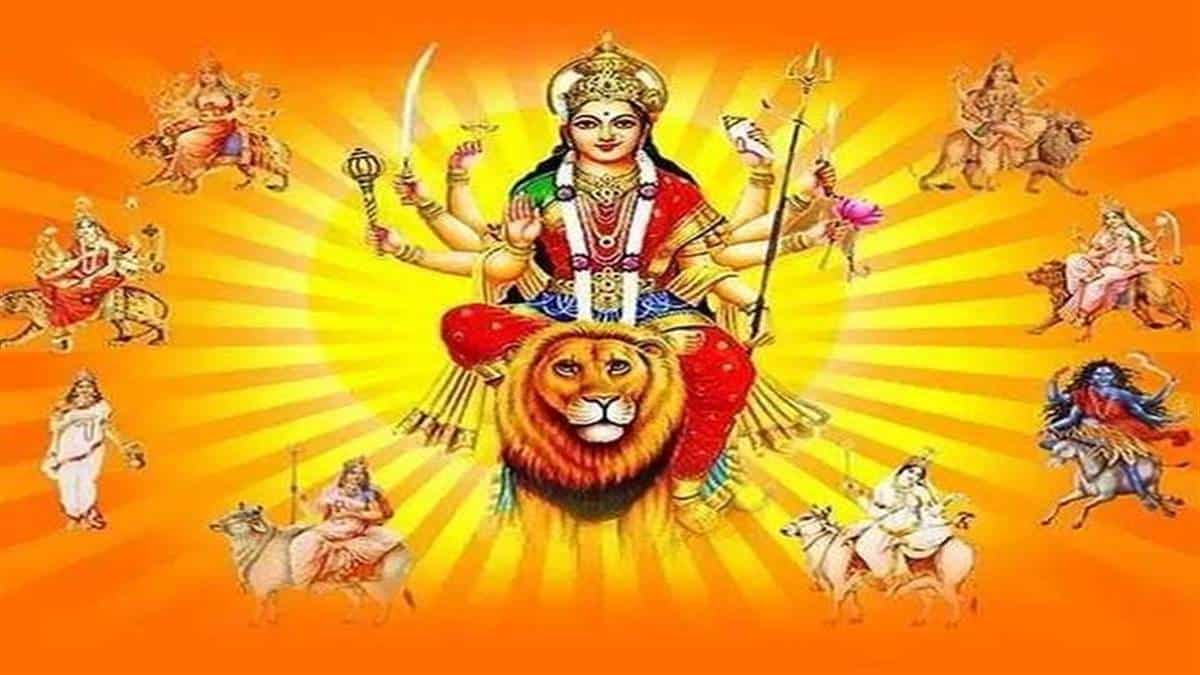
Informative
Gupt Navratri Sadhana for Seekers
In the tapestry of Sanatani traditions, Gupt Navratri emerges as a hidden gem, a sacred period shrouded in mystical significance. Unlike the grandeur of the widely celebrated Navratri, Gupt Navratri observed quietly and with deep devotion, holds a unique place in the hearts of spiritual seekers.
In this instructional blog, we will explore the transformative power of chanting the powerful mantra of Divine Maa Chamunda. Additionally, we will guide you through the rituals of Gupt Navratri, like establishing the Kalash, lamp placements, and other essential details to enhance your Gupt Navratri spiritual experience. Let’s begin.
Gupt Navratri Sadhana
Awaken to Divine Dawn: During the sacred days of Gupt Navratri, begin your days by embracing the sanctity of Brahma Muhurta (auspicious time before dawn). Rise with the sun, partake in a purifying bath, and wear attire that reflects the purity of your devotion.
Prepare the Sacred Space: Gather the elements for worship with reverence. Create a puja plate adorned with symbols of divinity. Clothe the idol of Maa Durga in hues of red, symbolizing the potent energy of the Goddess.
Nurture Life Within Earthly Pot: Sow barley seeds in an earthen pot, nurturing life within the sacred soil. Tenderly sprinkle water daily, fostering the growth that mirrors the spiritual journey unfolding within.
Blessings of the Kalash: Initiate the ritual by filling the Kalash with the purifying waters of the Ganga River. If you do not have water from Ganga, any water will do just fine. Adorn the mouth of Kalasha with mango leaves, place a coconut atop, and wrap it in red cloth, securing it with Kalava. Install the Kalash at an auspicious time, aligning with the divine vibrations of the universe.
Puja Rituals: Embark on the divine journey with puja rituals. Offer fragrant flowers, illuminate the sacred space with camphor and incense, and kindle the flame that symbolizes the divine presence.
Welcome the Divine Mother: Extend a warm welcome to Maa Durga, inviting her divine presence into your home. Gather the family, offer aarti, and present offerings with heartfelt prayers for happiness and prosperity.
Mantras and Hymns: Invoke the Goddess by chanting the sacred mantras of Maa Durga throughout the nine auspicious days. Immerse yourself in the powerful verses of Durga Saptashati and Durga Chalisa, allowing their resonance to elevate your spirit.
These sacred texts act as luminous guides, filled with verses dedicated to Maa Durga. Let each word resonate within, lighting the path for your transformative journey into the depths of spiritual awakening.
Potent Mantra for Gupt Navratri:
At the core of Gupt Navratri Sadhana lies the rhythmic recitation of the powerful mantra, “Aim Hreem Kleem Chamundaye Vicche.” Let this sacred chant serve as your bridge, connecting the material and the divine. Through its resonance, transcend the ordinary and embrace the celestial realms.
In the sacred embrace of Gupt Navratri, let every day be an opportunity for inner transformation. Dedicate a minimum of 45 minutes to meditation, immersing yourself in the serene depths of your soul. As you sit in stillness, let the mantra echo within, harmonizing your energies with the divine frequencies. This daily meditation practice becomes a sacred offering to the Goddess, amplifying the potency of your spiritual journey during this auspicious time.
Kanya Pujan:
Kanya Pujan is an essential part of Gupt Navratri. Respectfully invite 9 young girls into your home, worship them, and then offer them food. Understand that the completeness of Navratri worship is often achieved through
Kanya Puja as it symbolizes honoring the nine forms of Goddess Durga embodied in these young souls. Additionally, invite a boy to join them, as this child is regarded as the representation of Langura (Batuk Bhairav), the protector of the sacred spaces.
Kanya Bhojan:
During Navratri, a special tradition is to feed young girls on Ashtami and Navami. Offer them a feast of puri, chana, and halwa, symbolizing abundance and sharing the divine blessings. Scriptures say by offering food to nine girls aged 2 to 10, we cleanse our lives from various issues. Start by offering food to the Goddess, and then share it with the girls. This act symbolizes gratitude and aligns us with divine blessings. It’s a simple, powerful way to give and receive blessings during this sacred time.
Ghat Immersion:
Conclude the divine festivities by performing Ghat immersion on the final day of Gupt Navratri. Lift the Kalash from the altar, sing the aarti with devotion, and offer flowers and Akshat, completing the sacred cycle of worship.
Why is Gupt Navratri so important?
Gupt Navratri, akin to the quarterly occurrence of Navratri, aligns with the worship of ten Mahavidyas, as mentioned in Devi Bhagwat, connecting seekers with the divine feminine energy.
For those immersed in Tantric activities, Shakti Sadhana, and devotion to Mahakaal, Gupt Navratri holds a distinctive spiritual significance, offering a sacred space for empowerment.
Devotees observing fasts during Gupt Navratri engage in rigorous sadhana, following stringent rules, as a pathway to connect with the profound energies of Goddess Bhagwati.
Amidst deep meditation, practitioners seek to unlock rare powers, aligning their energies with the divine forces present during this auspicious period.
While traditional Navratri worship the same goddesses, Gupt Navratri offers a unique avenue for those inclined towards Aghor Sadhana, focusing on any of the ten Mahavidyas for spiritual success.
Devotees during Gupt Navratri revere Mahavidyas like Maa Kali, Tara Devi, Tripura Sundari, Bhuvaneshwari, Chinnamasta, Tripura Bhairavi, Dhumavati, Baglamukhi, Matangi, and Kamala Devi, delving into the realms of Tantra Sadhana.
As cosmic forces fluctuate, Gupt Navratri becomes a sanctuary where seekers honor Maa to safeguard against the rising cosmic calamities, emphasizing the spiritual connection with nature, inner expression of womanhood, and the celebration of sisterhood.
In Gupt Navratri’s sacred Sadhana, chanting, penance, and meditation on Maa Shakti are believed to obliterate life’s obstacles. Devotees fulfill wishes through secretive Tantra Mantra rituals, seeking hidden knowledge accomplishment. Gupt Navratri, mainly for Tantriks and Sadhaks, doesn’t bar anyone from tapping into Maa’s profound celestial energy. Let this hidden Navratri empower all on their spiritual journey, removing obstacles and guiding them toward divine enlightenment.
Please subscribe to our mailing list to stay connected and receive spiritual information. If you have any queries, please write to us at info@chamundaswamiji.com. You can check out our YouTube channel, Chamunda Swamiji, where you can learn Tantra, Mantra, Yantra, and Meditation from His Holiness Shri Chamunda Swamiji. If you seek to learn Shakti Kriya, please register with us, and we will get back to you.
Post a Comment
-
Subscribe to Our Blog
-
Categories
-
Popular Articles
- Dead moth in the house. What universe is trying to tell you?
- Spiritual Meaning of Moth
- Vivah Bandhan Curse – What Is It and How to Spiritually Heal It.
- The Dasa Mahavidyas
- What are Beej Mantras?
- Tripura Sundari | The Dasa Mahavidya
- Maa Bhuvaneshwari | The Dasa Mahavidyas
- The Five Shades of Tantra
- Ramakrishna Paramhansa – The Man who almost became a Woman
- Maa Chinnamasta | The Dasa Mahavidyas



